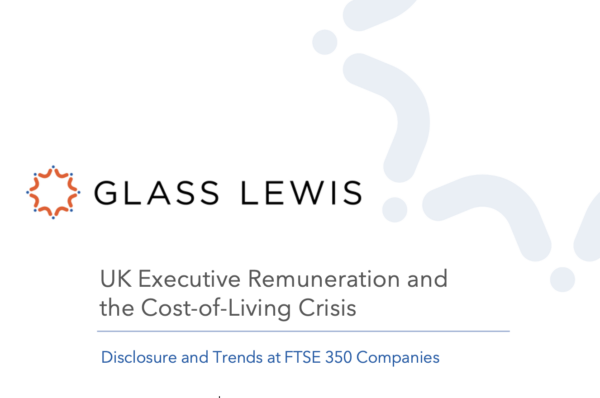
Under UK law, the expectation is that boards will be attentive to the wider workforce experience, particularly as it relates to decisions concerning pay. And with the cost-of-living crisis — referring to the squeeze on living standards brought about by higher inflation levels—front and centre, how public companies balance the treatment of their executives against other employees is likely to draw heightened scrutiny in the UK’s 2023 proxy season.
Investors have already set out revised expectations for managing the current environment. Based on data collected from AGMs since the 2022 proxy season, as well as our corporate engagement discussions in recent months, public companies appear to be responding with restraint when it comes to executive pay increases, along with additional consideration of (and in many cases monetary consideration for) the wider workforce.
Investor Expectations
Investors have expressed a keen interest in the cost-of-living crisis and its impact on their stewardship activities. In early November, the Investment Association (the “IA”), an organisation whose members collectively manage over £10 trillion of assets globally, published a letter to remuneration committees setting out an expectation that “executive experience is commensurate with that of shareholders, employees, and those most impacted by the cost-of-living crisis”, referring specifically to salary increases as an area of focus.
In addition, CCLA, the UK’s largest charity investment manager, published a joint statement in November with signatories representing an aggregate £3.2 trillion of assets under management, including Aviva Investors and Legal & General Investment Management, expressing concern and calling for action regarding the cost-of-living crisis.
It is also possible that investors will seek to directly influence company policy in this area via shareholder proposals. ShareAction’s resolution at J Sainsbury plc’s 2022 AGM calling for the company to accredit as a Living Wage Employer, which received the backing of ten institutional investors including Legal and General, HSBC, Nest and Fidelity International, could serve as a template.
Public Company Response
A recent shift in remuneration and disclosure practices relating to the wider workforce likely serves as guidance for the coming proxy season – and a warning to laggard companies. In previous years, there was a general expectation that executive base salary increases be aligned with the increases applying to the wider workforce. With inflation having a much greater impact on lower paid staff, and considering the leveraged nature of executive remuneration, whereby an increase in base salary generally has a compounding effect on the quantum of short- and long-term incentives, the recent trend is for workforce increases to exceed those of executives. In addition, our data shows a spike in the use of additional supports, such as one-off cash or share awards, or employee benefit; and companies are integrating more discussion of how consideration of the wider workforce factored into their remuneration decisions.
Glass Lewis Approach
Glass Lewis will evaluate all executive increases on a case-by-case basis, irrespective of the increase applying to the wider workforce, and will continue to expect any substantive increases to be accompanied by a thorough and convincing rationale. Further, while we welcome the provision of additional one-off cost-of-living supports, Glass Lewis is also mindful that such supports will not protect an employee’s purchasing power over the long term, or serve as a substitute for increases in base pay.
Looking for More?
The above is excerpted from our special report, UK Executive Remuneration and the Cost-of-Living Crisis. The full report features a range of data illustrating key market trends in pay and disclosure practices, along with analysis of what it means for proxy season 2023. We also look at company reporting, as well as the implementation of remuneration policies at FTSE 350 companies, with notable examples of effective disclosure. In addition, we provide an international perspective on the issue from other global markets.
The UK Executive Remuneration and the Cost-of-Living Crisis report is available to Glass Lewis clients via our Governance Hub and Viewpoint libraries. Get in touch for more information.
